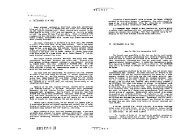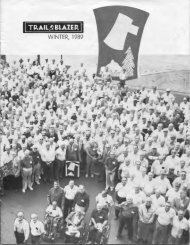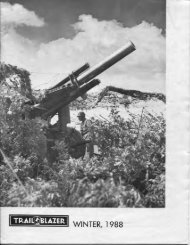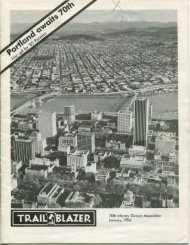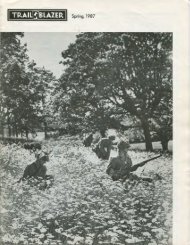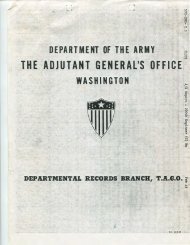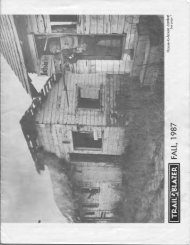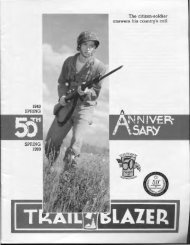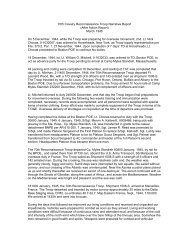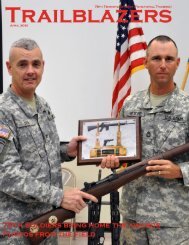Download - 70th Infantry Division Association
Download - 70th Infantry Division Association
Download - 70th Infantry Division Association
Create successful ePaper yourself
Turn your PDF publications into a flip-book with our unique Google optimized e-Paper software.
The 12th was comparatively quiet. The warm sun dried the roads somewhat, while in Forbach, the paved<br />
streets were completely dry and vehicles raised clouds of dust as they went by.<br />
A prisoner of war reported that the Germans might use gas. The Commanding General ordered all men to<br />
wear gas masks. Orders by the Regimental Commander to reissue all gas masks were fulfilled by S-4 in<br />
the early afternoon of the 13th of March. The night of. the 12th found increased enemy rocket fire landing<br />
on Companies F and G. Company B received heavy enemy mortar fire during the night.<br />
A report from S-2 of the 274th that 15 Mark V tanks were lined up between houses north of Stiring-<br />
Wendel caused our S-2 to warn all forward elements of a possible enemy counterattack, but no attack<br />
materialized.<br />
According to the records, on March 13, Staff Sgt. Brubaker is promoted to Tech. Sgt. We had eight men<br />
missing, wounded or killed in action. PFC Robert Adamson was promoted to Sgt. He was a gunner for the<br />
30 Cal. machine gun and now became a squad leader.<br />
On the morning of the 13th of March our patrols contacted the enemy still in position along the railroad<br />
embankment. Two enemy patrols moved into Company B area but withdrew.<br />
Around noon, S-2 was informed that civilians reported the enemy was evacuating Petite Rosselle and<br />
withdrawing to Luisenthal.. Civilians also reported later that the Germans had left Stiring-Wendel,<br />
Schonecken, and Gersweiler.<br />
At 1130 an observer of the 1st Battalion reported that enemy soldiers in full field equipment were<br />
observed leaving Petite Rosselle. Patrols from Companies A and C were sent into Petite Rosselle with<br />
orders to hold what they took, if they met little or no resistance. Patrols from the 274th Regiment were<br />
sent into the Simon Mine area on our right to contact the enemy.<br />
By late afternoon all patrols had reported either no contact with the enemy or meeting very little rear<br />
guard action. The "Bloody Axe" Regiment was ordered to pursue the enemy in force leaving Company I to<br />
clean out Petite Rosselle. However, later reports from patrols indicated that the town was clear of enemy.<br />
Therefore, Company I was sent to Rosbruck and cleared that village. They then rejoined their Battalion<br />
which was assembling in the University area to give chase to the Germans. The 1st Battalion, marching in<br />
column, was moving after the enemy by 1925. The 2d Battalion started across the railroad embankment<br />
shortly before 2000 with Company F on the right and Company G on the left. Company E moved along<br />
the railroad northwest and west. The 3d Battalion was assembling in the University area preparing to<br />
move to Klarenthal upon Regimental order. The 101st Cavalry on our left was on the move toward the<br />
Saar River. The 274th on our right was moving to the north toward the Saar. Shortly after our Regiment<br />
started moving, the Germans jammed our radios. The Battalions had no communications with their<br />
Companies until wire was laid.<br />
It was decided to send the 3d Battalion up to the Saar behind the advancing 1st and 2d Battalions and<br />
have the 3d Battalion patrol the south bank of the Saar for possible crossing points. After the 3d Battalion<br />
was assembled, it moved out for Petite Rosselle on its way to the Saar.<br />
During the night of 13-14 March, our troops officially crossed the pre-war French-German border at the<br />
outskirts of Petite Rosselle.<br />
The anti-tank ditch at that town stopped most vehicular traffic during the night. The Engineers worked on<br />
a crossing and had great difficulty with mines which were thickly scattered all around. They suffered<br />
several casualties.<br />
On March 14 our First Sgt. Ray McCreight, was promoted to 2nd Lt. The company moved from the<br />
defensive position and launched an attack at 1930 from 1/2 mile east of Forbach, France. We now held<br />
position one mile north of Kleinrossel, Germany.



